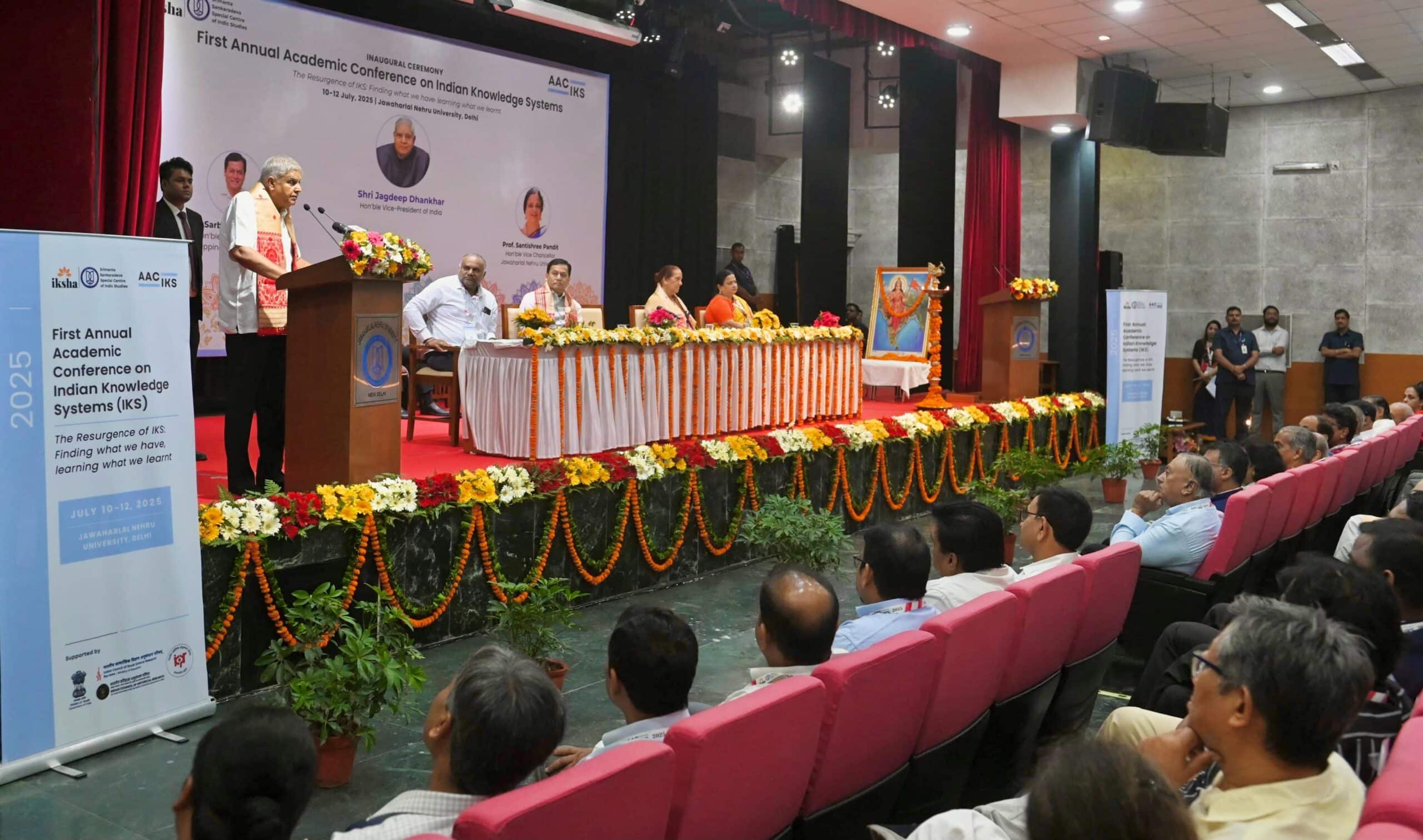India’s Rise As A Global Power Must Be Accompanied By The Rise Of Its

The Vice-President of India, Shri Jagdeep Dhankhar, emphasized the importance of India’s intellectual and cultural heritage in a speech delivered at the inaugural Annual Conference on the Indian Knowledge Systems (IKS) in New Delhi. He argued that India’s emergence as a global power must be rooted in its rich traditions and values, warning that a rise devoid of cultural depth is unsustainable. Dhankhar also critiqued the historical neglect of indigenous wisdom and called for a renewed focus on India’s ancient knowledge systems to foster a more profound understanding of its civilizational legacy.
India’s Civilizational Continuum
In his address, Vice-President Dhankhar asserted that India’s identity transcends the political boundaries established in the mid-20th century. He described India as a “civilizational continuum,” a concept that reflects a continuous flow of consciousness, inquiry, and learning throughout history. This perspective challenges the notion that India’s identity is merely a product of colonial history. Dhankhar highlighted the need to recognize and embrace the depth of India’s intellectual traditions, which he believes are essential for the nation’s growth and global standing.
He criticized the historical dismissal of indigenous knowledge as primitive, arguing that this was not merely a misunderstanding but a deliberate act of erasure. The Vice-President pointed out that even after gaining independence, Western constructs were often presented as universal truths, overshadowing the rich tapestry of Indian thought. He questioned how a nation could overlook its core values and urged a collective reflection on the importance of acknowledging and celebrating India’s intellectual heritage.
Historical Interruptions in Knowledge Systems
Reflecting on the historical disruptions faced by India’s knowledge systems, Dhankhar noted that the Islamic invasions and British colonization significantly impacted the country’s intellectual landscape. He lamented that these events led to a stunting of the Indian Knowledge System, transforming centers of learning into institutions that prioritized rote memorization over critical thinking. The Vice-President emphasized that the educational focus shifted from nurturing thinkers to producing clerks to serve colonial interests.
He expressed concern that this shift resulted in a loss of the rich traditions of contemplation and philosophical inquiry that characterized ancient Indian education. The Vice-President’s remarks underscore the need to revive the great Bharatiya Vidya Parampara, which he believes has been systematically undermined over the years. He called for a return to the values of critical thinking and intellectual exploration that once flourished in India’s ancient universities.
Reviving Ancient Centers of Learning
During his speech, Dhankhar highlighted the significance of India’s ancient universities, such as Takshashila, Nalanda, and Vikramashila, which were once renowned centers of learning long before European universities were established. He described these institutions as global hubs where scholars from various regions, including Korea, China, and Persia, gathered to exchange knowledge. The Vice-President emphasized that these centers were not just educational institutions but vibrant communities of intellectual life.
He urged for a more holistic understanding of knowledge that extends beyond written texts to include community practices and the intergenerational transmission of wisdom. Dhankhar called for the creation of digitized repositories of classical Indian texts in various languages, including Sanskrit and Tamil, to make these resources accessible to scholars and researchers worldwide. He stressed the importance of developing training programs that equip young scholars with the necessary tools to engage deeply with India’s knowledge systems.
Integrating Tradition with Modern Innovation
In concluding his address, Vice-President Dhankhar spoke about the dynamic relationship between tradition and innovation. He argued that the wisdom of the past should not be seen as an obstacle to progress but rather as a source of inspiration for contemporary challenges. He pointed out that ancient texts, such as the Rigveda and the Charaka Samhita, can offer valuable insights relevant to modern scientific and ethical discussions.
Dhankhar’s remarks resonate with the current global context, where knowledge systems that explore the interplay between the individual and the cosmos are increasingly vital. He called for a concerted effort to strengthen Indian Knowledge Systems, emphasizing that understanding these traditions can help address contemporary issues. The Vice-President’s vision for a revitalized engagement with India’s intellectual heritage aims to foster a more profound appreciation of the country’s rich cultural legacy while addressing the challenges of a rapidly changing world.
Observer Voice is the one stop site for National, International news, Sports, Editor’s Choice, Art/culture contents, Quotes and much more. We also cover historical contents. Historical contents includes World History, Indian History, and what happened today. The website also covers Entertainment across the India and World.
Follow Us on Twitter, Instagram, Facebook, & LinkedIn

